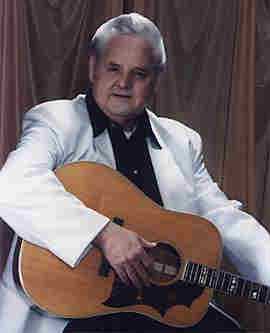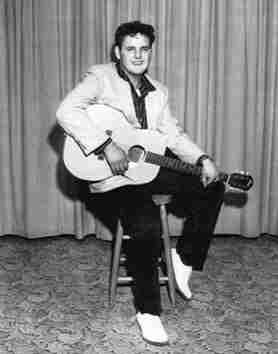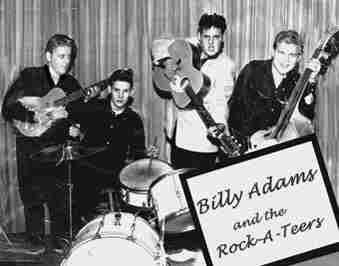Billy Adams

![]()
Willie Murray "Billy" Adams was born March 6, 1940, in Redbush, a tiny hamlet in Johnson County, Kentucky. His father, Charles McKinley Adams, worked for many years in the Van Lear coal mine (which is the same town mentioned in Loretta Lynn's "Coal Miner's Daughter"). His mother, Sarah Mullins Adams, worked as a housewife. After health problems related to asthma took their toll on his father, Adams' family moved many times in search of work. In 1942, the family relocated to Worthington, in Greenup County, Kentucky. There, in this small rural town along the banks of the Ohio River, the senior Adams worked in a railroad tie yard, and the family took in boarders who worked at the tie-yard, in order to bring in more income. Adams' mother cooked and cleaned for the family and boarders. Although times were tough, and food was scarce, he recalls that his mother would often feed passing hobos, sharing what little the family had, with those less fortunate. After the job at the tie yard ended, the Adams family moved back to Johnson County, not far from Redbush, in the fall of 1945. Adams remembers that, "living conditions there deteriorated to the worst that I can recall in my life." Those conditions forced a move back to Greenup County around September, 1948. There, Adams' father, assisted by the rest of the family, took up sharecropping, eking out a meager existence for the family, which by then included 14 children. It was that frustration which inspired Adams and his brother Charles, to dream dreams that were a world away from the poverty that had shackled their family to the Appalachian hills. It was in those extreme, hard times that Adams' interest in music and writing began to surface. After being influenced by the hillbilly music of Jimmie "the Blue Yodeler" Rodgers, the Carter Family, Moon Mulligan, and others that came into their house through an old, battery-powered radio, Billy and Charles, who could not afford real music instruments, began singing and accompanying themselves by pounding out hard-driving rhythms on lard bucket lids. Soon the brothers borrowed a Harmony guitar from a friend, Doris Messer, and their father taught the pair some basic chords, which they practiced diligently.
Billy Adams' lonesome, rebellious voice was first heard on radio in 1952, at WCMI, in Ashland, Kentucky. There, he performed along with his brother, Charles, in an "Opry" style setting, along with other artists. During that performance, it just came natural for him to pound out the same rhythm on the guitar that he had created on the lard bucket lid. The gathered crowd was quite taken with the young mans talent, and he began to feel that his dreams could come true.... and he was moved.
In early 1954, after hearing Elvis Presley for the first time on the radio, Adams was impressed, and he recognized in Presley's music, the same driving rhythm, that he himself had developed. Soon after hearing the new boy from Memphis, the die was cast, and Adams, at 15, quit school and organized a band, Billy Adams and The Rock & Roll Boys. This three-piece band consisted of Adams on the pounding acoustic rhythm guitar, his brother, Charles, on the electric lead guitar, and Curtis May on the upright bass. Soon the boys would leave home to pursue the life of full-time musicians, working on the road. Sometime, in the fall of 1955, Adams and the band traveled to Cincinnati, Ohio, and recorded "Rock, Pretty Mama", at Rite Recording Studio. The song was released in 1957, on Quincy Records. Adams was very motivated by the experience, and he began to think of his career on a larger scale. He recalls that while performing with the band in Springfield, Missouri, he stopped at a pay phone, and made a call to Sun Records in Memphis, Tennessee. After introducing himself as "Billy Adams from Kentucky, a sixteen year-old boy with a record," he received an invitation from Jack Clement to come to Memphis. However, his excitement was soon tempered by the fact that his '49 Ford needed a new transmission. Lacking the funds to repair it, he sold the car for fifty dollars, and he and the band canceled the remainder of the tour, and beat a hasty retreat back to Kentucky. (Little did he know that the trip to Memphis would not come about for many years to come).
Back on more familiar turf, the band continued to tour, and promote their new record. Although "Rock, Pretty Mama" failed to chart, it did attract the attention of Glen McKinney, the owner and engineer of the Mack Recording Company. After seeing the band at a performance at The 440 Club in Portsmouth, Ohio, McKinney offered Adams a record deal. McKinney's company was located in Nau-Voo, a tiny rural section in West Portsmouth (so named after the Indian tribe who once settled in the area). His studio was housed in a small converted garage, and Adams remembers that, "the echo chamber was an outside fuel tank, and the studio itself was barely big enough to breathe in." On March 1, 1957, Adams and his band recorded two of his original compositions, "You Heard Me Knocking" and "True Love Will Come Your Way". For the session, the group was expanded to include McKinney's son, Randy, on drums, Bob "Satchmo" Swaub on piano and Bobby Lawson on rhythm guitar. Pleased with the outcome of the recordings, McKinney and long-time friend Frank Porter (likely with the help of Lee Hazelwood), arranged for a licensing deal with Randy Wood of Dot Records in Hollywood, California. In January of 1958, a 45 rpm record of the songs was released on Dot, and it received good reviews in Billboard (Jan. 27, 1958).
Charles Adams, Randall McKinney, Billy Adams, Curtis May.
By the end of the decade, Adams and his band (now named, Billy Adams and The Rock-A-Teers), recorded six more originals for McKinney's now famous Nau-Voo record label, including, "You Gotta Have A Duck Tail" (a regional teen favorite), "Walking Star" (Billboard, Dec. 8, 1958), "Return of the All American Boy" ( featured in Spotlight Winner's of the Week in Billboard magazine, March 2, 1959), "That's My Baby", "Blue Eyed Ella" and "The Fun House".
Though many high points marked his colorful life, major success, and wide-spread recognition eluded him. Tired by the rigors of the road, and with increased family demands for him to settle down, in 1959, Adams and The Rock-A-Teers performed their last show together. When the last song was finished, and the final curtain fell, it was closing time, and the band was gone. Adams' heart ached for the part of him that was left behind, his brother, his buddies, and a sound. Although Adams eventually went on to record over 43 secular and 100 gospel songs, the Nau-Voo sessions brought to a close his early rockabilly career. All of the records released by him on Quincy, Dot and Nau-Voo, are now listed in rare records books and hunted by collectors around the world. (Quincy 932, "Rock, Pretty Mama", in near-mint condition, is now valued at between $1,500-$2,000, in The Official Price Guide to Records: 2001)
In addition to original band mates Charlie Adams and Curtis May, other musicians that recorded and performed with Billy Adams in the '50s and '60s, include Dave Thornhill, John Thornhill, Randy McKinney, Leonard Fritz, David Harrell, Thurman Gumbert, Sticks Livingston, Bobby Lawson, Bob Swaub, Denver Moore, Jim Hill, Cliff Young, Denny Crisp, Fred Evans, Luke Gordon, Red Nance, Dale Throckmorton, Tony Edwards, Pat Williams, Johnny Caines, Roger Caines and Bob Morris.
For the next three decades, Billy Adams went on to write, record and perform rock 'n' roll, country and gospel music. In 1965, Adams received his call into the ministry. From 1966 to 1993, he ministered to audiences across the U.S. and abroad, using the music that he helped to create, as part of his ministry.
By the 1980s, and continuing into the late '90s, Adams' early records began showing up on compilation releases on MCA, Ace, Bear Family and other labels, both here and abroad (twenty-one to date). While that has brought his old music to light again, it has also brought some confusion with it. It seems that there were several other artists with the name "Billy Adams", who had recorded for Decca, Sun, Capitol and other labels in the late '50s and early '60s. One European vinyl record entitled, Rock , Pretty Mama (Domino 1012), released on Domino Records in 1992, includes cuts by four different "Billy Adams", making no distinction between the singers. The record also states that: "Billy Adams died on December 3, 1984," apparently the Billy Adams who recorded for Sun Records in the 1960's had passed away that year. Adams remembers that at a show several years ago, he was approached by a fan who asked him to sign the album, and Adams was shocked to read his own obituary there on the record! Adams maintains that he has never been paid royalties from any of the releases.
Undaunted by the news of his early demise, and unwilling to be just another relic from the past, Adams set about reviving his rockabilly career. In 1998, he finally made it to Sun Studio in Memphis, Tennessee, and there he recorded an album's worth of material. Upon arrival at Sun, he stated that, "I'm Billy Adams from Kentucky, and although it took me 42 years to get here, here I am!" The album, Legacy, was released on Screen Door Records, a Nashville based indie label, in 2000. On the CD, he revisits many of his now-classic records, including "Rock, Pretty Mama", and also recorded several new rockabilly songs that he had penned. As a testament to his relevancy in today's music market, the CD release party was held at Billy Block's Western Beat Roots Revival. The show, hosted by Block, is a long-standing favorite of Nashvillians, and features the best in alternative, and roots-country music.
Adams' music is now receiving notice from some of Nashville's elite musicians, such as Robert Reynolds and Nick Cane (formerly of The Mavericks), and noted bassist Dave Rowe. They, along with others, are joining Adams in performance, helping to expose this stalwart and enthusiastic artist's music to a new generation of fans. In April of 2001, Adams performed at Viva Las Vegas 4, a rockabilly show in Las Vegas, Nevada. Of that performance, Tony Wilkinson, one of Europes most respected reviewers, wrote about the show, "Boy, this guy is good and possesses a powerful voiceÉ., Billy looked every inch, a '50s rocker.. ." Adams was recently inducted into the Internet Rockabilly Hall of Fame, and many of his early records are housed in the Country Music Hall of Fame, in Nashville, TN. Adams has recently re-located to the Nashville area to be closer to the music business, and has taken on new management and booking. With the renewed interest in his music in Europe, he is now planning to tour there for the first time, and has been invited to appear in October, 2002, at The Hemsby, one of the preeminent rockabilly "weekenders" in England. With other offers coming from Germany, and other parts of the continent, Adams is now set to capitalize on the revival of his music, that he recorded so many years ago.
Copyright Clif Doyal, August 2001
Reprinted on the Johnson Co.GenWeb with permission of Billy AdamsRead more about Billy Adams at: http://www.rockabillyhall.com/BillyAdams.html
Special Thanks to Billy for his permission to use the above. Thanks Billy!!


